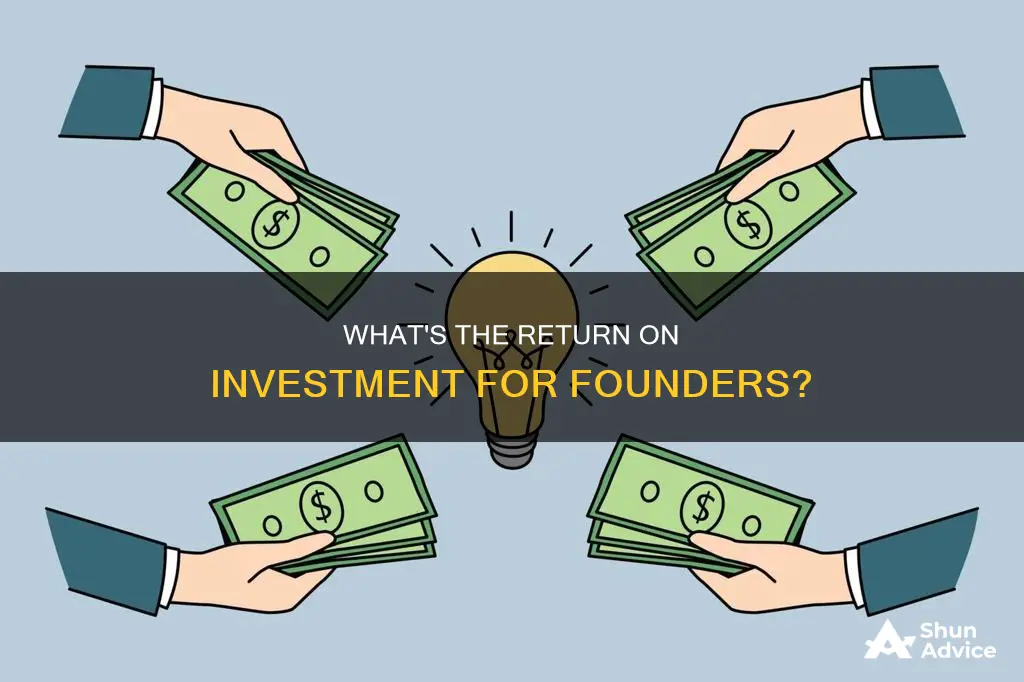
When founders receive investment funds, they typically give investors a stake in their company in the form of equity. This means that investors will own a percentage of stock in the company and will receive proportional compensation once the company is sold or goes public. Founders may also offer debt-based fundraising or convertible debt, where investors loan money to the company with the expectation of repayment with interest, or with the understanding that the loan will be converted into equity at a later date. Founders should carefully consider the advantages and disadvantages of each type of investor funding and determine which option aligns best with their company's goals and financial needs.
What You'll Learn

Founders can give investors equity in their company
Equity investments are attractive to investors because they offer the potential for high rewards without the burden of a repayment schedule. Investors are typically looking for liquidity, which means they expect the company to either be sold or go public in the future. Founders should be aware that giving up equity is usually a one-way street, and it narrows their options in the future. Once equity is sold, it cannot usually be bought back, and the investor remains part of the business.
Equity investments are often sought when a company needs a long runway, has zero collateral, cannot bootstrap, or is positioned for astronomical growth. It is a good option for companies that need a sizeable infusion of operating cash to sustain themselves before turning a profit, as it is the only form of capital that makes sense in such cases. Equity investors are willing to take on more risk than lenders, so they are an attractive option for founders with little to offer as collateral.
When deciding on equity investments, founders should be mindful of the high competition for such funding and the time it takes to secure these investments. It is a lengthy process that can easily take 3-6 months, and it is a challenging task to stand out from the thousands of deals investors consider each year. Founders should also be cautious about giving up too much equity, as it limits their ability to raise funds in the future by selling additional equity.
Understanding Passive Index Funds and Their Investment Types
You may want to see also

Founders can give investors voting rights
When founders get investment funds, they are often faced with the issue of share dilution, which can lead to a loss of control over their company. To counter this, founders can give themselves and investors super-voting common stock, which offers shareholders larger proportional voting rights compared to any other class of stock issued by the company. This allows founders to maintain control of their company while still giving equity to employees and investors.
Super-voting stock is a special class of stock that is becoming common among startups. It faces pressures from investors, index providers, and regulators. This type of stock is designed to offer the main members greater control over the voting rights of the company, and thus, more control over the board and corporate actions. With super-voting stock, hostile takeovers are prevented as the main members can maintain most of the voting control without owning more than half of the outstanding shares.
The super-voting structure typically gives shareholders one vote per share, with the founders getting shares with multiple votes. The ratio for super-voting stock is usually 10 votes per share, although this number can vary. This allows founders to easily keep control over the company even as they issue new stock to employees and third parties.
However, implementing a super-voting structure can be challenging when it comes to raising money, especially from venture capitalists (VCs) and other institutional investors. History has shown that investors are unlikely to invest in a structure where one or two unproven founders completely control the company's destiny. As a result, dual-class common stock structures are often unwound when the first round of VC financing comes in. Additionally, having this structure in place during the early stages of a company may scare off investors who don't want to battle with what they may perceive as an arrogant founding team.
Despite these challenges, super-voting common stock can be a viable option for founders concerned about losing control of their company. It is important to carefully consider the fiduciary duties and justifications for implementing such a structure and to consult with experienced legal counsel before making any decisions.
Skills for Investment Fund Managers: Expertise for Success
You may want to see also

Founders can give investors a say in the direction of the company
Equity investors will typically receive voting rights, which they can use to influence strategic company decisions. The more equity they hold, the more voting power they will have. This can be an attractive option for investors as it gives them more control over their investment and a say in the direction of the company.
Founders can also offer investors super-voting rights or special voting rights, which grant them even greater voting power compared to other shareholders. This ensures that investors have a say in major strategic decisions and gives them the ability to approve or reject key moves by the company.
However, it is important to note that giving up equity means giving up a certain level of control and ownership in the company. Founders should carefully consider how much equity they are willing to give up and ensure that they are comfortable having investors as part of their business for the long term.
Mutual Fund Investment: Current Smart Choices
You may want to see also

Founders can give investors a share of future profits
Equity fundraising is often chosen when a company needs a long runway, as it can provide a sizeable infusion of operating cash to sustain the business before it starts turning a profit. It is also a good option when the company has zero collateral, as investors are willing to take a chance on the idea without anything to "sell" if the business fails.
Equity fundraising is also a good fit for businesses that cannot possibly bootstrap, such as those that require a massive amount of capital just to get off the ground. For example, a private jet service would need a large amount of capital to purchase planes and other necessary equipment.
Additionally, equity fundraising is attractive to investors who are positioned for astronomical growth. Investors are interested in the potential for massive growth and exponential paydays. For example, a company with a vision to build the next Starbucks chain would likely attract investors interested in jumping onto the bandwagon on the road to IPO.
However, it is important to note that choosing the equity route narrows the company's options when it comes to its future. Equity investors are focused on liquidity, so they will not be satisfied with a cut of the profits each year. Once the company accepts their money, they will expect the endgame to be either a sale or an IPO. As such, it is crucial for founders to be certain that investor support is the best or only way to move their business forward before pursuing equity fundraising.
Vanguard Windsor II: Uncovering its Security Strategy
You may want to see also

Founders can give investors a stake in their intellectual property
There are a few rules to consider when it comes to intellectual property and investors:
- Assigning IP to the Company: Founders should ensure that all IP is owned by the company, including any IP created by employees or contractors. This can be done through IP Assignment Agreements and employment contracts with IP Assignment clauses.
- Dual Company Structure: Some startups opt for a dual company structure, with a holding company and an operating company. In this case, the holding company owns the IP and can license it to the operating company or other entities.
- Licensing IP: The holding company can license the IP to other companies, subsidiaries, or joint ventures. Licensing provides controlled access to the IP for a specific time and purpose without transferring ownership.
- Registering IP: Registering trademarks, designs, or inventions provides legal ownership and makes enforcement of intellectual property rights easier. Registration is also valuable when seeking investors or selling the business.
When it comes to investors, founders should carefully consider how much equity they are willing to give up in exchange for investment. On average, founders offer 10-25% of their equity during a seed round, and this percentage decreases as the company progresses. It's essential to negotiate with investors and assess their value beyond just the capital they bring.
Additionally, founders should be mindful of common pitfalls, such as over-distributing equity or lacking a clear understanding of equity distribution. A well-structured equity plan ensures that the company's ownership stake remains in the right hands and fosters trust and alignment among stakeholders.
Dave Ramsey's Investment Strategy: Specific Fund Choices
You may want to see also
Frequently asked questions
There are two main types of investments: equity investment and debt investment. Equity investment involves exchanging money from an investor for partial ownership of a company, often in the form of an initial public offering (IPO). Debt investment involves acquiring a significant amount of debt with the expectation of repayment with interest to invest in a company or project.
The repayment scenario can vary depending on the type of investment and the situation. Some common methods for repaying an investor include:
- Regular monthly payments or a one-time payment of the loan and interest due.
- Repayments at a preferred rate, where the investor receives priority payback according to pre-arranged terms.
- Buying back the investor's shares at a predetermined price.
- Repaying a loan by swapping the debt for equity shares, giving the investor proportional ownership of the business.
- Paying dividends to stockholders, which are cash payments made from the company's net income.
If a startup fails and the founders are unable to repay investors, there can be serious consequences. The company's stock price may plummet as investors lose confidence and sell their shares. The company may also default on its loans, leading to the lender demanding immediate repayment. If the company cannot repay the loan, the lender may foreclose on its assets. In some cases, the company may have to declare bankruptcy, resulting in creditors being paid first before shareholders or investors.







